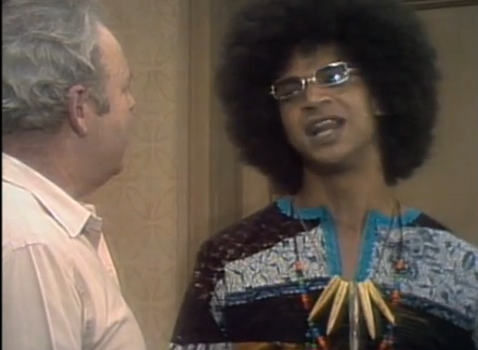Episodes: All in the Family's "Everybody Tells the Truth" and the perils of the Rashomon episode

(My apologies for any details I get wrong. I had intended to revisit this episode before writing this, but life, as they say, got in the way.)
I love Rashomon episodes, even though they almost never purport to show what they say they're showing and even though the gimmick can very quickly wear out its welcome. There's something irresistible about the idea of an episode of TV showing us events from multiple perspectives, especially if those perspectives belong to characters we've come to know well. (The term "Rashomon," in the event that you didn't know, comes from Akira Kurosawa's film of the same name, which presented the same series of events from a variety of perspectives. The film now seems a bit crude, but at the time, the narrative device was legitimately groundbreaking.)
It's also one of my favorite types of episodes in the sense that you can really only do it once you get to season three or later. Most other gimmick episode types can be hauled out in the back half of season one (once it becomes safe to start really experimenting), but the Rashomon episode needs such a firm grounding in character to really be successful that it's hard to do without giving the audience several seasons to acclimate. It also tends to work better within the network TV season, because it's by its very definition a throwaway episode, one designed to let the actors have some fun in the middle of the long grind that is broadcast network TV. So, for that reason, there seem to be fewer Rashomon episodes than there once were, or maybe I'm just not seeing them.
"Everybody Tells the Truth" was the 21st episode to air in All in the Family's third season. It is, in many ways, a classic Rashomon episode, with all of the strengths and pitfalls of the form. The Bunker family's refrigerator is broken. The repairman who came to fix it eventually left before completing the job. Archie and Mike have very different reasons for why this happened, but when Edith tells her version, the audience finally sees what really happened and how both Archie and Mike are guilty of stereotyping the repairman and his black assistant in their own harmful ways.
The strengths of a Rashomon episode become incredibly apparent from the first in this episode. Even if you've only seen a couple of episodes of All in the Family before (or even if you've just sort of heard of the show's premise), this is a FUNNY episode. The jokes come fast and furious, and they're all inherently rooted in character. Seeing the different ways that Mike and Archie interpret the situation allows for the very best kind of joke structure, where the jokes themselves can be funny in isolation but also build on top of each other and reference back to other things that happened. The actors, particularly Ron Glass (who plays the assistant), have a ton of fun as different versions of the core truth. Sometimes, it's just nice to watch a show you like cut loose a little bit, and "Everybody Tells the Truth" certainly allows All in the Family to do that.
Yet even as this is probably my FAVORITE All in the Family episode, it's instructive in how the Rashomon episode doesn't always work. The confines of television don't really allow for a subtle consideration of the limits of human perspective and point-of-view (as the pretty-good but ultimately disappointing The Affair has found out as it pushes further and further into soapdom), so that means that these sorts of episodes almost always become over-obvious and a little cloying. They tend to pick one aspect of a character and hammer home how that aspect would make them view the world differently.
Take, for instance, "Bad Blood," a beloved X-Files episode that I've always found fun but nowhere near my top episodes list. At the center of "Bad Blood" is a one-joke premise, which is that Mulder and Scully have very different views about paranormal phenomena, which means that they have very different views of a weird little Texas town that might be vampire-ridden. The episode digs quite a bit into how the two view each other, so I don't want to unnecessarily dog it, but at its center, it's a one-joke kind of thing.
The same is true of "Everybody Tells the Truth." Archie is a knee-jerk conservative; Mike is a knee-jerk liberal. The two versions of the truth in this episode have a lot of fun with how this colors their perceptions of events, but the episode can never escape the fact that it has to heighten their points-of-view to the point of absurdity to get its message across. In some ways, Archie's version of the story is Mike's version, in that it's the kid's worst fears about what his father-in-law actually thinks (and vice versa). And that's fine as it goes, but it's not actually to the level of psychological insight that you might have gotten from, say, the episode where the two get trapped together in a room at the bar after hours. It's a trick designed to make you think you're getting psychological insight, where you're not.
What makes "Everybody" work for me is, paradoxically, what should be least satisfying about it: Edith's version of the story. TV abhors inconclusiveness, so that means several Rashomon episodes eventually cycle around to what "really" happened, which is always disappointing. One of the things about life is the fact that we're all looking at it very differently and can never cross that gulf, but TV has trouble with that idea.
And yet I never fail to be impressed by the scene where Edith tells her own version of what happened, and we see the way that Archie's prejudices turned a routine business transaction into something that flew off the rails. It's a touch didactic (hello, it's this show), but there's also real feeling in it. This is prejudice, out there in the open, as it really is, often, and it's hard to look at. What ultimately makes the episode work is how it doesn't blink when it needs to take a hard turn toward the dramatic. That was a quality that served All in the Family well many times over the years, and it's what makes this episode, for me, one for the time capsule. --
Episodes is published daily, Monday through Friday, unless I don't feel like it. It is mostly about television, except when it's not. Suggest topics for future installments via email or on Twitter. Read more of my work at Vox Dot Com.




